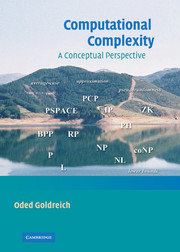Book contents
- Frontmatter
- Contents
- List of Figures
- Preface
- Organization and Chapter Summaries
- Acknowledgments
- 1 Introduction and Preliminaries
- 2 P, NP, and NP-Completeness
- 3 Variations on P and NP
- 4 More Resources, More Power?
- 5 Space Complexity
- 6 Randomness and Counting
- 7 The Bright Side of Hardness
- 8 Pseudorandom Generators
- 9 Probabilistic Proof Systems
- 10 Relaxing the Requirements
- Epilogue
- Appendix A Glossary of Complexity Classes
- Appendix B On the Quest for Lower Bounds
- Appendix C On the Foundations of Modern Cryptography
- Appendix D Probabilistic Preliminaries and Advanced Topics in Randomization
- Appendix E Explicit Constructions
- Appendix F Some Omitted Proofs
- Appendix G Some Computational Problems
- Bibliography
- Index
4 - More Resources, More Power?
Published online by Cambridge University Press: 05 June 2012
- Frontmatter
- Contents
- List of Figures
- Preface
- Organization and Chapter Summaries
- Acknowledgments
- 1 Introduction and Preliminaries
- 2 P, NP, and NP-Completeness
- 3 Variations on P and NP
- 4 More Resources, More Power?
- 5 Space Complexity
- 6 Randomness and Counting
- 7 The Bright Side of Hardness
- 8 Pseudorandom Generators
- 9 Probabilistic Proof Systems
- 10 Relaxing the Requirements
- Epilogue
- Appendix A Glossary of Complexity Classes
- Appendix B On the Quest for Lower Bounds
- Appendix C On the Foundations of Modern Cryptography
- Appendix D Probabilistic Preliminaries and Advanced Topics in Randomization
- Appendix E Explicit Constructions
- Appendix F Some Omitted Proofs
- Appendix G Some Computational Problems
- Bibliography
- Index
Summary
More electricity, less toil.
The Israeli Electricity Company, 1960sIs it indeed the case that the more resources one has, the more one can achieve? The answer may seem obvious, but the obvious answer (of yes) actually presumes that the worker knows what resources are at his/her disposal. In this case, when allocated more resources, the worker (or computation) can indeed achieve more. But otherwise, nothing may be gained by adding resources.
In the context of Computational Complexity, an algorithm knows the amount of resources that it is allocated if it can determine this amount without exceeding the corresponding resources. This condition is satisfied in all “reasonable” cases, but it may not hold in general. The latter fact should not be that surprising: We already know that some functions are not computable, and if these functions are used to determine resources then the algorithm may be in trouble. Needless to say, this discussion requires some formalization, which is provided in the current chapter.
Summary: When using “nice” functions to determine an algorithm's resources, it is indeed the case that more resources allow for more tasks to be performed. However, when “ugly” functions are used for the same purpose, increasing the resources may have no effect. By nice functions we mean functions that can be computed without exceeding the amount of resources that they specify (e.g., t(n) = n2 or t(n) = 2n). Naturally, “ugly” functions do not allow for presenting themselves in such nice forms. […]
- Type
- Chapter
- Information
- Computational ComplexityA Conceptual Perspective, pp. 127 - 142Publisher: Cambridge University PressPrint publication year: 2008



